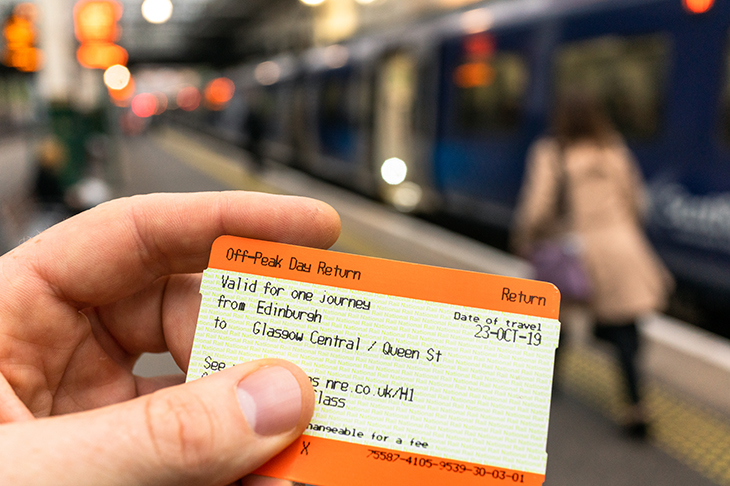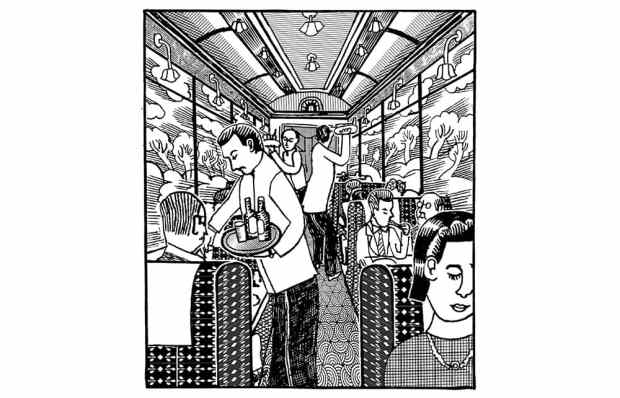Outside mathematics, the word ‘commute’ can mean two things. Mostly it refers to the act of making a daily journey between one’s home and work; more rarely it describes replacing one penalty with another — as in ‘the Home Secretary commuted the death sentence to one of life imprisonment’.
The curious may wonder why one verb is used in two different ways. The reason is intriguing. In the early days of rail travel, workers in Chicago could ‘commute’ the cost of a daily rail ticket into a lower price per journey by buying an annual, or ‘commutation’ ticket. The word commuting originally referred to the act of reducing your ticket cost, then later came to denote the resulting travel.
This lexicographical leap contains an important lesson. It hints at the extent to which changes in human behaviour can be led by innovations in pricing. Many commuters could not have afforded to move to the suburbs had a discount not been available. Commuting is not commutative: x × y≠ y × x. Two hundred people might happily pay £50 to go to Canterbury once a year, but you can’t get one person to pay £50 a ticket when they make the journey 200 times a year. That’s why season tickets were invented.
Sadly, the attention devoted to pricing in most businesses is dismally low in proportion to its importance — in part because good pricing requires a lot of experimentation. Asking consumers what they are willing to pay doesn’t work. (How many would have told James Dyson: ‘Yep, £300 for a hairdryer — sounds about right’?)
Laker Airways, the original low-cost airline, got it wrong: it charged people lower prices the nearer to the departure date they booked. Now low-cost airlines ramp prices up as the date of travel approaches. As a Ryanair spokesman explained: ‘If you’re booking two days before you fly, it’s either a business meeting or a funeral. You’ll pay what we ask.’
Too few other businesses experiment. Even Jeff Bezos met huge resistance within Amazon when he first suggested launching Amazon Prime. I recently asked an audience of French transport experts why most French autoroutes charge the same at 2 a.m. as at 5 p.m. It seems it never occurred to them to do otherwise. Yet it seems obvious to make autoroutes cheaper late at night, if only to prevent sleepy provincial towns having their windows shaken by an E. Leclerc 18-wheeler five or six times a night.
So we should be grateful that rail operators and lobbying groups such as the Campaign for Better Transport are demanding a rethink of UK rail pricing. The annual season ticket is an anachronism conceived for a time when people’s routines were unchanging: it is woefully unfair to part-time or flexible workers who must either pay for journeys they never make or else pay the full price every time. The campaigners also wish to end the practice of making single tickets senselessly expensive compared with returns, and to abolish the absurd cliff-face which separates peak and off-peak prices, a practice which creates needless overcrowding on the first off-peak train of the day.The great train robbery: why Britain’s rail prices need a rethink
The length of a rail franchise is too short to allow for much experimentation. What is needed is an allowance for the costs of experimentation in the franchise agreement. Train companies could start by copying airlines, who offer low base prices mixed with optional extras. The new Avanti trains on the West Coast route sensibly plan to offer a third, ‘Premium Economy’ class. Why not Speedy Boarding too? I would pay to board the train to Manchester 20 minutes before it leaves, rather than being made to stare at the Euston departure board like a dork until three minutes before departure.
Got something to add? Join the discussion and comment below.
Get 10 issues for just $10
Subscribe to The Spectator Australia today for the next 10 magazine issues, plus full online access, for just $10.
You might disagree with half of it, but you’ll enjoy reading all of it. Try your first month for free, then just $2 a week for the remainder of your first year.















Comments
Don't miss out
Join the conversation with other Spectator Australia readers. Subscribe to leave a comment.
SUBSCRIBEAlready a subscriber? Log in